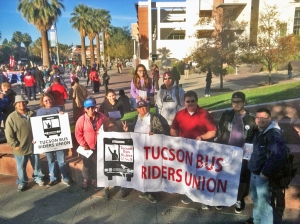by Ian Merrill,
Ian Merrill is a University of Arizona student from Phoenix, majoring in Economics and Chinese! He attends the Catholic Newman Center and is a member of the Tucson Bus Riders Union.
I was asked recently how working with the Tucson Bus Riders Union relates to my Catholic faith. At first, I was not entirely sure. Of course, if you asked almost anyone on any street corner, they would likely immediately tell you that Jesus supported broad, feel-good concepts such as justice and equality. When it comes to the concrete application of those concepts, however, the answer is not so easy.
As a Catholic, a good place to start exploring tough questions is to examine the teachings and writings of important Catholics, such as saints and popes. In fact, the popes have advocated the principles of Catholic social teaching ever since Pope Leo XIII published his encyclical Rerum Novarum in 1891. Many of Pope Leo XIII’s successors have further elucidated upon these important ideas, including Pope John Paul II in Centesimus Annus, written on the one hundred year anniversary of publishing of Rerum Novarum, and, even more recently, Pope Benedict XVI in Caritas in Veritate, published on July 7, 2009.
Catholic social teaching, chiefly, focuses on the dignity of every human being, the principle of subsidiarity, and the principle of distributism. The principle of subsidiarity supports the idea that power and decision-making ought to localized as much as possible, rather than centralized in the hands of higher levels of government. In addition, the principle of distributism emphasizes the importance of just distributions of wealth, property, and the means of production.
Although I knew very generally about these important facets of Catholic teaching, they had never been more clearly presented to me than they were through the actions of Pope Francis. I am not alone in being inspired by Pope Francis to concretely live out the tenets of Catholic social teaching rather than merely regard them as theological notions. Pope Francis is still only a human being, but his actions embody Catholic social teaching, giving them a physical expression and creating a living model. Pope Francis certainly inspires me to work for greater social justice.
Now, you may be wondering how all of this applies to the Tucson Bus Riders Union. The fight to prevent the Tucson City Council from balancing the budget on the backs of poor people is integrally tied to Catholic social teaching. A fare increase will make it even harder for many families and people here in Tucson to make ends meet. Clearly, when someone must decide between paying for the bus to be able to get to work and properly feeding their children, that person’s dignity has been severely compromised. Plus, taking money from the poor to pay for services like the streetcar, which will serve a select and generally privileged sector of society, does harm to a just distribution of wealth and it is simply not fair.

